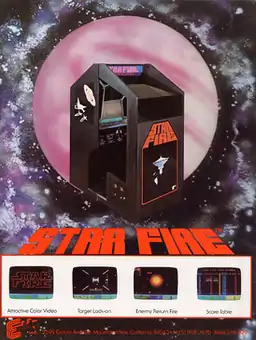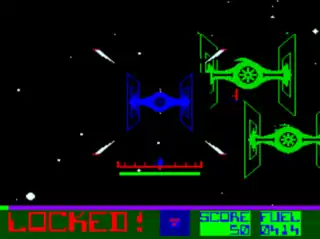Star Fire
Star Fire is a first person space shooter arcade game released by Exidy in 1979. It is the first arcade game to use a sit-down cockpit,[1][2] and the first arcade game to allow a player to enter his or her initials into the high score table.[3][4] Star Fire is in full color without the use of monitor overlays, which was innovative in 1979.
| Star Fire | |
|---|---|
 Arcade flyer | |
| Developer(s) | Exidy |
| Publisher(s) | Exidy |
| Designer(s) | David Rolfe Ted Michon |
| Platform(s) | Arcade, Atari 8-bit, Commodore 64 |
| Release | 1979: Arcade 1983: Atari 8-bit, C64 |
| Genre(s) | Space combat |
| Mode(s) | Single player |
The look and feel of Star Fire is directly lifted from the movie Star Wars, though the game is not officially licensed. The attract-mode displays the name Star Fire in the same swooping sans-serif display typeface used by the Star Wars main titles. The enemy spaceships are TIE fighters and the player's primary weapon is an array of 4 lasers that fire in an "X" pattern, implying that the player is flying a ship somewhat akin to an X-wing. The enemy base looks like the Death Star. Additionally, the exterior of the cabin is illustrated with ships culled from concept design artwork of Battlestar Galactica (such as the earlier alternative designs for the Cylon Baseships, by Ralph McQuarrie.
Gameplay

The player flies through starfields, zapping enemy starfighters out of existence. The player controls whether the ship is moving forward or backwards via a lever, and a control yoke translates the player's view left, right, up, or down. The player has a button that fires quad-linked lasers at a targeting reticle. The lasers travel slowly, taking about two seconds to reach their target, and only one shot can be in the air at once. Furthermore, each shot the player fires causes heat to build up in his ship. If the player's rate of fire is too high, the guns will overheat and need to cool down before they will fire again.
If the player can maneuver such that a TIE fighter-like ship is directly in the targeting reticle, the weapon will "lock on" and any shots fired will automatically hit. When the player successfully shoots an enemy fighter, the screen displays "GOT HIM". Occasionally, a thinner, horizontally oriented ship that looks like a Colonial Viper from Battlestar Galactica will be seen. These have "Exidy" written on their tails, and are worth the largest number of points. If the player successfully shoots this ship, the screen displays "GOT US". These ships can not be locked onto.
The game is timed and the more money is put in, the longer the player can play. As the player shoots enemy ships, they increase in skill, and also in point value. If the player reaches certain point thresholds, more fuel is obtained, extending play. The player's ship can be shot; this simply resets the quality of enemies (and thus their point value) down to the lowest level.
Reception
A 1983 article in Electronic Games called Star Fire a "closet classic ... deserving of a better fate", and "ahead of its time and unable to find a market".[2]
Legacy
Epyx ported Star Fire and another Exidy game, Fire One!, to the Atari 8-bit family and Commodore 64, and released them in 1983 as an arcade classics compilation.[5]
Exidy created an update called Star Fire II which improved the high score table.[6] It was intended to be shipped with later machines, but was not used.
Star Fire is one of the few games where the copyright holder has granted permission to freely run the game in MAME for non-commercial purposes.[6]
The current record for the high score is 9,780 points, set by Laura Curran of Las Vegas in January 1982. As of 2010 this was the oldest high score record in the Twin Galaxies arcade database.[7]
Easter Egg
Entering certain sets of initials into the high score table will cause the game to display certain messages:
- "DBR" → "HI DAVE, I HOPE YOU ARE WELL".
- "SKO" → "HI SUSAN".
- "TZM" → "HI TED. MAY THE FORCE BE WITH YOU".
References
- "Star Fire". The International Arcade Museum. Retrieved 7 Oct 2013.
- Pearl, Rick (June 1983). "Closet Classics". Electronic Games. p. 82. Retrieved 6 January 2015.
- "High Score"
- Medler, Ben (2009). "Generations of Game Analytics, Achievements and High Scores". Eludamos. Journal for Computer Game Culture. 3 (2): 177–194.
- "Arcade Classics: Star Fire / Fire One!". Atari Mania. Retrieved 2011-02-01.
- "Star Fire". MAME.
- The Denton Arcade Game Examiner: Longest-standing classic arcade video game record revealed, 03 May 2010